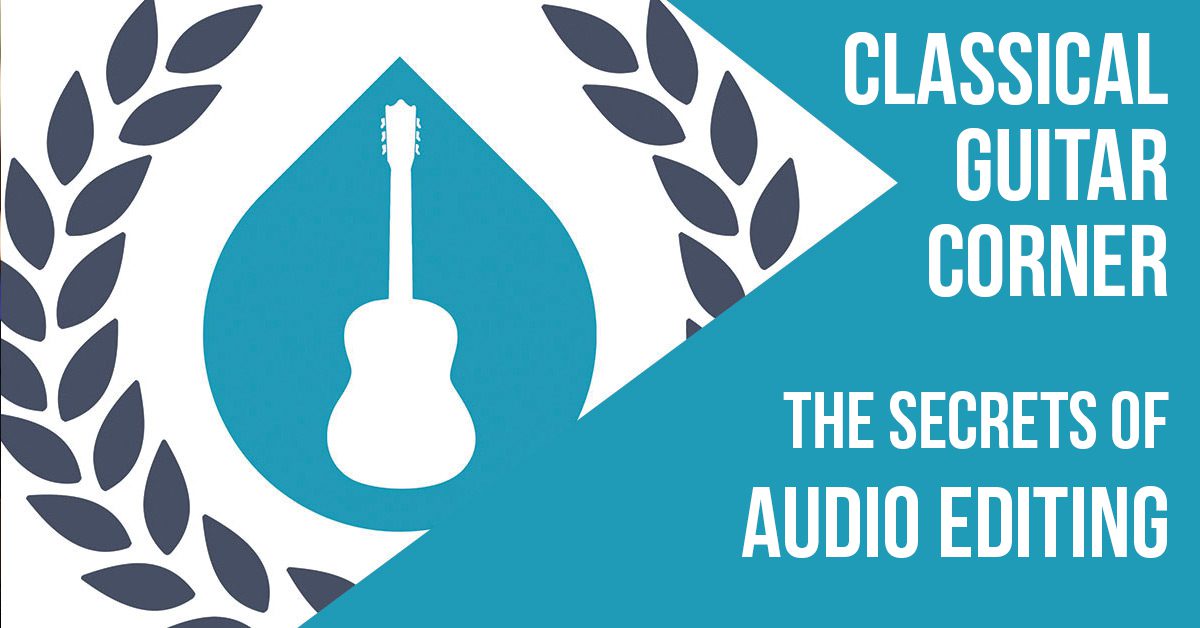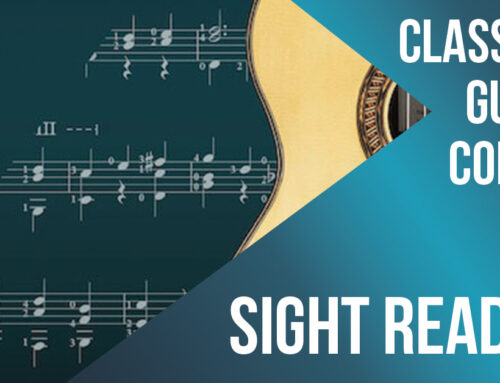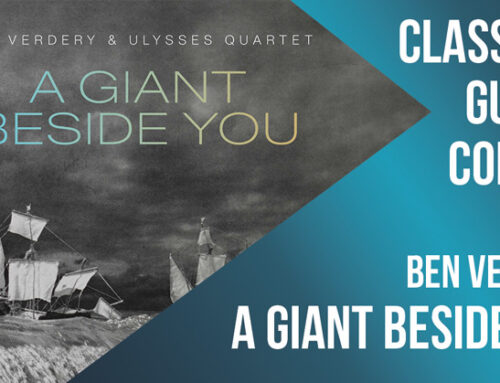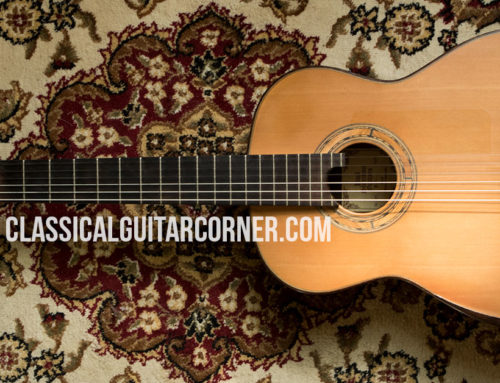Podcast: Play in new window | Download
Subscribe: Apple Podcasts | RSS
In this episode of The Classical Guitar Corner Podcast, Simon gives you tips on audio editing. Here Simon picks apart the editing process of classical guitar recordings and will change the way you listen to recordings of classical guitar music. (So, if you’d like not to know in-depth about that process, you might want to skip this episode!) For everyone else, however, this is an excellent look behind the curtain, so to speak, about how to listen anew to some of your favorite recordings and about how you might go about editing your own recordings. There’s also a big announcement at the beginning of the episode, so even if you’d rather skip knowing about the audio editing process of classical guitar recordings, at least have a listen to the first five minutes or so!
Let’s dig in to the secrets of audio editing.





Thank you Simon for another interesting podcast. It’s good to know about editing being done but I have no problem with someone trying to give a listener the best representation of what they can do. It’s amazing what technology is capable of today!
It really is amazing isn’t it, Linda?! Thanks for your comment.
Peace,
Dave B (CGC team)
Great podcast. I’ve known about this technology but haven’t fully used it. I’ve added some reverb and compression to my recordings before but never quite understood what they were other than that it sounded better. As far as editing I think it depends on the audience. I think on an educational site like this, where students are recording themselves to improve and to get feedback from their peers, it would be a disservice to themselves and their peers. If on the other hand you are recording yourself for a wider audience that might listen to your recording for pleasure many times over I think it would be welcome. But I still think there is something special about a live unedited recording.
Thanks for sharing your thoughts, Roger. I agree there is definitely something special about a live, unedited recording (from both a performance and listening standpoint).
Peace,
Dave B (CGC team)
A very interesting podcast. Audio editing of recordings is like photoshop post-processing of photos. I feel like both are fun ways to create.
Alas, I don’t know anything about audio editing. But I’m glad to get a window into it.
As a student, I feel I should present unedited work. All blemishes are revealed so that I can grow as a player and work on my weeknesses and celebrate my strengths.
As a listener, audio performances are like art. They can be edited to create sounds for a listener to enjoy. It really gets the mind going to what is possible.
Thanks for sharing your thoughts, Kari!
Peace,
Dave B (CGC team)
Thank you for this helpful and relevant podcast. As an adult amateur, I wondered for years how performers were able to produce such flawless performances on their recordings. Once I learned that it is fairly common practice to record classical guitar works in “takes,” usually broken down into small manageable sections, it all began to make sense. Over the last few years, I have experimented with this process (and posted a few here on CGC) and found it has given me a new way to improve my playing and help me prepare for actual “live” performances.
When it comes to learning and teaching sessions,I think live performance and unedited video submissions are essential. Oh, the anxious jitters of playing for others, let alone one’s teacher! One needs to see and hear the genuine state of play in order to isolate challenges and improve. If one is recording a CD or making a performance video for distribution, the use of digital editing can be a valuable artistic tool.
Still, at the end of the day, hearing a well prepared live performance, is an aural and visual experience that is hard to compare.
Thanks for your thoughts, Rick! I especially think you’re right about how essential it is to be able to live through one’s jitters, if you will, in front on one’s teacher in order to continue to grow and face the challenges necessary to improve. Great thoughts.
Peace,
Dave B (CGC team)
Great podcast. And great news about additions to the team.
I find it extremely frustrating and time consuming trying to record a performance without mistakes. On the other hand, preparing for, and performing live, mistakes and all, is less frustrating and more rewarding. The main take away from this podcast is “lighten up on the recording pressure. “
I could use some specific tips when switching from practice for learning a piece to practice for performance. The two are different I think. Going from the stop start mode to playing through mistakes.
Hi Rick,
Yes, that’s a great point: practice and performance are indeed different. It’s important to practice not only to work through trouble areas and to learn a piece in many different ways, but also to practice performance. And it’s very important to separate performance practice from your usual routine. Here’s something to try: find a different place where you can practice than you usually do and even dress up for the occasion as you would when you might perform, and imagine yourself in front of an audience. Practice bowing at the beginning and end of your performance and perhaps between pieces; practice speaking about the pieces if you plan on doing that (very important to try that out before you do it if you’re not used to public speaking!); and, most importantly, practice playing through your whole program just as you would in front of an audience. This is an excellent way to rehearse your performance before you actually do it. If you record this session then you can use your next practice routine to identify problems you’d like to fix, something that works in your normal practice routine but not something you’d want to do in front of an audience. Thanks again for your comments. Give that a try and let us know how it goes!
Peace,
Dave B (CGC team)
Just finished walking the dog and listening to this podcast (along with some other old ones). This topic of recording and audio editing is very timely for me. I am just at the point in my return to the guitar where I am looking at improving my videos and my recordings, and I really had no idea how this worked. I guess I am either a little stupid or maybe just naive — but although I rationally knew that there must be ways to enhance the audio experience, I really never looked into it, until now. Looks like a rabbit hole! However, like my friend Alice, I think I am ready to venture into this wonderland, and Simon’s intro came at just the right time. At this point in my development as a returning guitarist, I can see that attention to audio and recording techniques will probably make me more attentive to the musical issues I want to give attention to — tone, phrasing, the overall shape and mood of the performance. So…like the challenge of learning to make videos, time to sound the horn to the hounds and give chase.
Thank you Simon. This was indeed a fascinating presentation on a very controversial topic.
Fist of all I totally agree when you said: “An edited version is the best representation of what a person can do. If you have the opportunity to create a more perfect result, you will probably take it.”
Indeed. That’s what I’ve been trying to do for quite some time now. The results have not been very good, but with the help of some wonderful friends and CGC members (Vaughan Edwards and Rick Lord in particular), I’m now getting better results.
I used to play in front of my camcorder and hope for the best. Once I realized I needed some more light in front of me, I got a very good video. But horrible sound! What’s the point of a guitar video that looks great but SOUNDS terrible?
So I started using my computer to get better audio while my camcorder was doing the visual part. Then I (sort of) synchronized the two. The result was effective if I wanted to show it to my teacher for him to point out and correct mistakes, dynamics, musicality, etc., but not good enough to keep.
On the occasions that I have played for an audience I’m bound to squeak, buzz, etc., and hope my friends don’t hear it. The good news is that they rarely do (smile). They just enjoy it and tell me that my music is wonderful. I know better.
A good example of this is when my nephew and I played duets for the entire family a year or so ago. That performance (which I did with my iPhone and put in CGC) has lots of flaws, but because it is totally spontaneous, and unedited (it even has birds singing in the background!), it seems to shine on its now.
However, when my goal is “to create the best representation of what I can do at this moment” (something I can keep and watch when I am in my wheel chair when I turn 90), then my audio/video recording is not good enough. The microphones are merciless and pick up every single buzz, and squeak (I have even heard my own breathing!). As you quite rightly said, I came to realize that it’s virtually impossible for me -an amateur musician- to get a satisfying performance in just one uninterrupted take.
That’s when I started getting into editing.
So I bought Final Cut Pro, and Logic Pro, and bought books and took lessons on Internet, etc. Well, …. I very quickly realized that trying to cut and paste a video is way beyond my capabilities. Editing audio is not that simple either, but the learning curve is not as steep. This brings me to another point: I found that I was putting more time in computer technology than on my guitar. Do I want to spend my time learning how to become a video/audio engineer, or do I want to improve my guitar playing? The answer was clear to me. I switched to iMovies and GarageBand instead of the other more powerful programs for the simple reason that they are much easier to use.
To cut a long story short, this is what I’m doing now.
1.- I record and edit the audio as best as I can
2.- I make the video as I play along with my own recording
3.- I put them together
It is beyond the scope of this writing to get into the details of those three steps;
but I was delighted to hear you say that all professional musicians do the same.
What does the product of this approach look/sound like? My first attempt is the video of Weiss Fantasie which I uploaded on CGC.
I finally want to say that the process of making such a video has helped me tremendously. That’s because I play passages again and again, always looking for the best possible way to play a given segment.
Thank you, Simon for a great discussion on a most interesting topic.
Armando
Thanks for sharing your thoughts, Armando! You make a great point when you mentioned how much time you were putting into figuring out the editing process and when you ask: “Do I want to spend my time learning how to become a video/audio engineer, or do I want to improve my guitar playing?” That certainly helps put things in perspective. Thanks so much for your comments!
Peace,
Dave B (CGC team)
I thoroughly enjoyed the audio editing podcast. It opened my eyes on the importance of not being your own worst critic.
I have played guitar for just over 40 years. I was inspired by guitar music l heard on radio and records that were at my house. Acoustic guitar music became my passion at an early age. I was extremely fortunate that my parents enjoyed music and that a guitar was available.
My early attempts to learn to play guitar involved many hours of picking guitar parts from recorded music. At that stage in my journey of mastering the guitar, I was not aware of editing. I was under the false impression that the musicians were infallible. I tried extensively to replicate what I heard on recording. There were many times that I succeeded but then again, there were many times I didn’t. The times that I didn’t lead to frustration and self doubt.
I wish that I had listened to this early on as it applies to many life experiences. Surely, we should always strive to be the best version of ourselves but we need to remember and respect that everything and everyone is unique. Having said this, we easily fall into a trap of self doubt when we compare our abilities to any form of “edited” media.
Thanks for this podcast, Simon. The technology is ingenious and effective, and I think it’s good for amateur players, like me, to be aware that even professionals’ recordings contain fixes. You did us a real service here—it’s important to do our best, but not be discouraged by small flaws when playing!
It’s sometimes said that having a choice is a privilege, and I believe that’s true, especially in regard to earlier times. And, in earlier times, all performances were live performances and the audience size was not global as it is today. So, technology has given us both sides.
Audio editing is a way to make performances more perfect and, of course, we all want to play as well as we can, but I’m wary of Perfectionism, broadly applied. I’ve given it some thought, over the years, in regard to raising children, work projects, and performances, including public speaking. Of course, it depends the personality, whether the drive is internally motivated or externally enforced, etc. I think it depends… I’d play through a difficult passage 100 times to correct a “stumble,” but I wouldn’t make my kids retake the SAT (college entrance exam) 10 times to possibly get a 1% better score.
I get so much pleasure from playing simple pieces badly I don’t listen to professional recordings that much. Just a few minutes here and there for inspiration. I’d like to see more live performances though. I think there is a growing desire for things to be either raw and authentic or CGI’d the hell out of like Star Wars and nothing in between.
H Simon,
an interesting podcast about technique of recording.
my view is to embrace the technical developments and enjoy the experience of listening to the final product.of others, i have greater joy when listening when there are no mistakes but i am well aware of the editing technology.
we need to hear life performances to keep the balance in what and how we experience music.
for myself to find satisfaction in a musical idea and find a way to express it satisfactory even with mistakes is the joy i get out of my playing, better sometimes with an audience.but the world is not always as we want it to be.
I appreciate this podcast immensely. Not only did I learn a lot but it also taught me that I can give myself a break. As an adult learner I cringe every buzz and thudded note. Now I have some perspective. It doesn’t ruin me to think that these perfect sound recordings are edited, it just makes me realize that is reality. Thank you for your exclamations
Thank you for this fantastic podcast, I’m really glad I stumbled upon it and find each episode as interesting as the next! I am a Visual Effects Compositor by trade and an ‘adult amateur’ student learning to play classical guitar for the sheer beauty of it. My profession has me take videos from different sources and combine them all together to make one cohesive video (think ‘photoshop’ for video). I am definitely guilty of being my own worst critic and having been way too hard on myself for not matching these impossible standards set forth by YouTube videos, even though I knew many of them were edited. The same goes for high-end visual effects laden movies and my expectation of pressing that ‘make movie magic’ button. The perfectionist in me sees these polished products as a challenge to continue to strive for excellence in the execution of my art and classical guitar playing. In that regard, perhaps edited products are a good source of inspiration! It’s certainly ideal to maintain perspective though, so that we don’t get frustrated when we don’t play perfectly every time. Nothing replaces experience, and intelligent practice is critical. Thanks again, just wanted to share some thoughts…
Thanks for your comment, Ari. That’s a great point and a nice perspective, regarding drawing inspiration from these polished products as they keep pushing us to improve at our own craft. Very helpful thoughts!
Peace,
Dave B (CGC team)
Simon, what software and mic are you using, or do you recommend? I have been making recordings on my smartphone. I’m not aspiring to be a sound engineer, but it would be nice to step up the quality of my recordings a bit. Thanks.
Hi Justyn,
Simon uses several different mics (including some very nice Schoeps mics as well as the built-in capsules with his Zoom H6 at times) and uses Adobe Audition for editing.
Peace,
Dave B (CGC team)
I don’t know how I missed this one. ha I could definitely talk about audio editing for hours. In fact, I do almost every day. I think the amount of editing is dependent on the style of music. In college, we had an assignment with 4 takes of “Habanera”. Each take had mistakes. Our goal was to splice those takes, paste them together, then using crossfades, make it sound like one take. I’m okay with this form of editing. Editing has come a lot further than just cutting and pasting though. People were doing this on tape before digital audio. In the digital realm, I can stretch the tempo of the audio or change the pitch. I can create harmonies that were never recorded by the musician. I can select one out of tune note in a chord and fix it. I can remove background noise or remove the reverb from a room. For me, when these tools are used to give the illusion of talent, that’s when it’s too far.
Comment on 17:34
Hi Simon, great podcast and very recognisable issues on editing classical guitar, and life itself. As an example of these two going together I can tell you this story:
Already many years ago, but in the same musical life as ever, I was listening to a wonderful recording of the music of Albéniz, played by the great Cuban guitarist Manuel Barrueco. I was listening in the middle of the night, over my headphone. I realy like the silence of the night, everyone asleep, no traffic in the streets, and just music…a single classical guitar singing Albéniz memories of Cataluña…
At a certain moment I woke up from being into this music by a noise coming from outside, from the empty street in the night, where all seemed quiet…
when suddenly I heard children shouting, calling, crying out loud…not immediately realising if they were laughing…it was a sound far away, but clear and no mistake it came from the street…
While listening with my headphone off I looked through the window but could not see anything happening, all life seemed quiet and silent.
So getting back to Albéniz and Barrueco I continued listening to the recording, from the start, to restore my musical dream.
But then again I heard children crying, shouting, suddenly, and I immediately went to my window again to open it to watch the dark street to see what was happening…again, no signs of people, children, all life silent and sleeping.
When I again started to listen the Albéniz album and when again there was this “sudden noise of children” running and shouting, probably playing out on the streets I realised these streets must have been outside the church, somewhere in Cuba, where on the same moment of Barrueco performing and recording Albéniz, outside children must have been heard, behind the closed churchdoors, but clearly enough to make it to the same microphones that took the sound of Barrueco, and through that again, as an extra echoe of time and life, the sound of Cataluña in Albéniz’ time. The children, out in the sunny streets of Cuba, gave the music, the place, the moment, a genuine sign of real life, a realy touching one. A multidisciplinair way of editing and layering life and music so to say. Or even more: editing as the surprise act that music and life itself make upon us, rather than the opposite, in wich we edit and present “ourselves” as such.
Not of any importance, just as a story to share here when listening your podcast on editing classical guitar.
Cheers, Reli.
What a fantastic story, Reli! Now I will be going to dig up my old recordings of Barrueco playing Cataluna to hear this intersection of art and life! Best wishes to you.
Peace,
Dave B (CGC team)
Very interesting Simon. In Classical Guitar Magazine Norbert Kraft said -the average 65 minute recording has 300 to 700 edits!!! Given the pandemic though I think it’s safe to say that many more musicians are looking at recording themselves at home. While a phone is capable of doing this there are certainly better options. It’s a complex and possibly expensive proposition. Maybe you could do a podcast on how we amateurs could get into it – maybe compare devices like the zoom handy recorders and what about stepping up to better microphones, both with something like a zoom recorder or with an audio interface connected to your computer. It seems like you can get a pretty good set up now for about $500 or $600 (a 2 input audio interface with a couple of decent condenser microphones).
Another great topic well done.
My thoughts went not to music recorded for sale or for pure enjoyment, but to recording performances for evaluation or grade exams. In this case, the question is what defines one’s ability. Performance in any type of thing varies. There is our mean ability, and there is the variation around it. Our mean/average ability hopefully keeps rising, but along the way we’ll have that error bar where we both exceed it and fall short, regressing to the mean overall. Wanting to submit a single unedited video of a performance tempts the student into repeated takes showcasing their ‘best.’ But that best case is inevitably followed by something worse, and the worst case is inevitably followed by something better. That’s regression to the mean. So maybe we should evaluate ourselves more forgivingly knowing this, not looking for error-free performances but a rising average and a thinning error bar. – “I play this piece, at this time, on average *this* well.” When in doubt about what that average is, I recall Dr Kageyama suggesting that the ‘cold first take’ is a good benchmark.